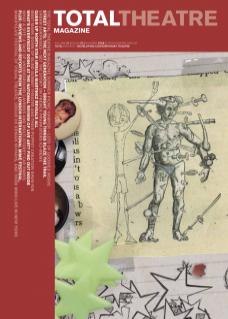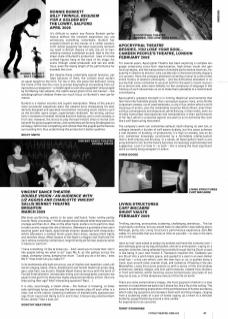For several years, Apocryphal Theatre has been exploring a complex language comprising cross-form improvisation, high-stress visual and gestural syntagms, and the manipulation of multiple performative matrices, frequently in relation to director Julia Lee Barclay’s characteristically slippery cut-up texts. Here, the company attempts (not without irony) to confront the entire history of western philosophy – and the difficulties attendant in requiring that canon somehow to account both for the west’s recent recourses to torture and, even more lethally, for the complicity of language in the framing of such obscenities so as to make them palatable to a mainstream constituency.
Apocryphal’s greatest strength is in limning theatrical environments that feel more like habitable places than conceptual spaces; here, artist Birthe Jorgensen creates, out of used textbooks, a city in flux, within which a shifting group of actors, plus the remarkable musician Alison Blunt, enact their various convergences and dispersals, while Barclay, in their midst, semi-satirically transcribes discrepancies and interpolations in their performance of her text, which is projected against one wall so as to dominate the room like a self-destructing monument.
The company’s work can sometimes exhaust itself chasing its own tail, or collapse beneath a burden of self-aware dubiety, but this piece achieves a real dynamic of building, of productivity. It’s high on anxiety, low on desire; sometimes knowingly constrained by a formidable intellectualism that is both bracing and bruising. In a sense, all Apocryphal’s work is preprogrammed to fail, but the failure becomes increasingly sophisticated and suggestive. Love it or hate it – or both – this is among the most significant work currently being essayed in London.

